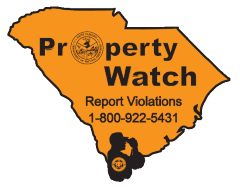Civil Trespass (Dogs on Property)
Dogs pose a special problem, as criminal laws at present do not apply to dogs. Civil action must be initiated against the owners/handlers. A civil trespass can be initiated by a landowner against the owner or handler through a magistrate. In an incident, as an example, in which a landowner has habitual problems with other hunters dogs on property; the following steps of prevention are recommended.
Step 1 - Contact the owner/handler/club president of the dogs and explain the problem of the dogs and ask relief from the problem. This should be done in writing so proper documentation will exist.
Step 2 - On the second or subsequent occurrence, follow step one again and advise that if a problem occurs again, a civil complaint for damages will be filed with the local magistrate. Again this should be done in writing.
Step 3 - On the third occurrence, gather the appropriate evidence by getting the name of the dog owner off collar, vehicle tag, number of vehicles attempting to recover dogs, take pictures of dogs, and fill out "Property Watch Checklist". The landowner should proceed to the local magistrate and explain to the judge that the landowner wishes to file a civil complaint. The judge will ask questions about the incident(s) and have the landowner complete a complaint form. The judge then will issue a notice to the dog owners/ handlers that a suit has been filed against them and set up a trial date, if the landowner evidence and documentation supports the complaint of civil trespass. The magistrate only has jurisdiction for damages up to $5,000.00. Damages above $5,000.00 will go to a higher court.
Step 4 - The trial will proceed as any civil case with both sides presenting reasons for/against the complaint. The prior documents action and evidence such as photographs and vehicle information will be a great help to the landowner.
Note: To many landowners this may seem somewhat cumbersome, however "dog trespassing" is a specialized problem that has no quick fix at present. The SCDNR recommends that the landowner secure the services of an attorney for severe problems.

